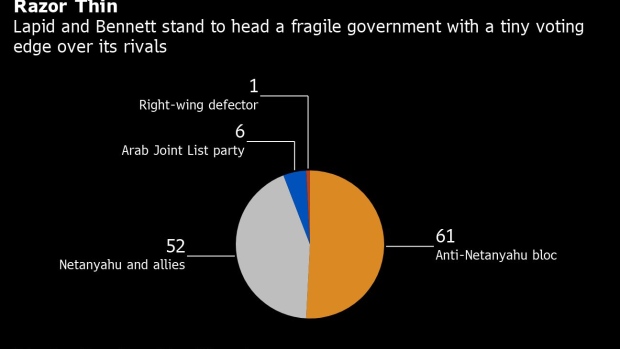Jun 13, 2021
Israel to Vote on Fragile Coalition to End Long Netanyahu Rein
, Bloomberg News

(Bloomberg) -- Benjamin Netanyahu’s record-setting run as Israeli leader approached a precipice Sunday as lawmakers are set to vote on a coalition with conflicting ideologies but united in ousting the indicted prime minister and ending more than two years of political turmoil.
Parliament will hold its confidence vote on the proposed government led by Jewish nationalist Naftali Bennett and centrist Yair Lapid in the afternoon. Most analysts expect a narrow victory for the two men despite pressure from Netanyahu and his Likud party on right-wing politicians to abandon the broad alliance that threatens to end his dozen years in office.
Under their power-sharing agreement, Bennett would serve first as prime minister until August 2023, and then hand the reins to Lapid, who will start out as foreign minister.
Israel would hurtle toward a fifth election in 2 1/2 years should the coalition be rejected. Parliament would have three weeks to pick any of its 120 members for a final 14-day shot at forming a government, though chances of success are low and failure would dissolve the assembly. Netanyahu, head of Israel’s largest party, already faltered in his attempt to form an administration, before ceding the chance to Lapid.
At the top of the coalition’s agenda is passing the first national budget in three years to assuage concerns from investors and ratings agencies over Israel’s emergence from the global health crisis. Unemployment and government debt surged last year but Israel has for years been plagued by low productivity, a high cost of living and inequality. Four inconclusive elections over two years, spurred in part by Netanyahu’s ongoing corruption trial, only deepened its problems.
The Economy Israel’s Post-Netanyahu Government Stands to Inherit
Finding agreement on diplomatic and security policy among the coalition parties will be difficult since it houses factions that are secular and religious, hawkish and dovish, and includes an Arab party for the first time in Israeli history.
That makes some looming regional issues potentially destabilizing. The U.S. is calling for reconstruction in Gaza after it was pummeled by Israel in last month’s 11-day conflict with Hamas, fighting that spilled over into violence between Jews and Arabs in Israeli cities. Negotiations to reinstate world powers’ nuclear deal with Iran, Israel’s top foe, could also complicate relations with Washington.
Bennett, a 49-year-old millionaire and former technology executive, who heads the small Yamina party, teamed up with Lapid after the elections in March produced the fourth stalemate in two years.
The ex-defense minister wavered over his decision during the fighting in Gaza, but eventually decided Netanyahu didn’t have enough seats to form a right-wing government and avoid yet another round of balloting, giving form to what would be the most unlikely government in Israel’s history.
Or, according to Netanyahu, a coalition that endangers the country’s future.
He argues that a government including Lapid and left-wing partners would cower before international pressure to revive the Iran deal, which Netanyahu characterizes as a path for the Islamic Republic to threaten Israel with nuclear weapons. And he insists that a government dependent on an Arab party would appear weak in the eyes of Palestinian militants.
Out of office, Netanyahu would be plunged deeper into a legal nightmare as he’d no longer have the opportunity to pass legislation shielding a sitting leader from prosecution. The premier says he’s innocent of any wrongdoing and the corruption charges against him are a plot by his rivals.
©2021 Bloomberg L.P.






